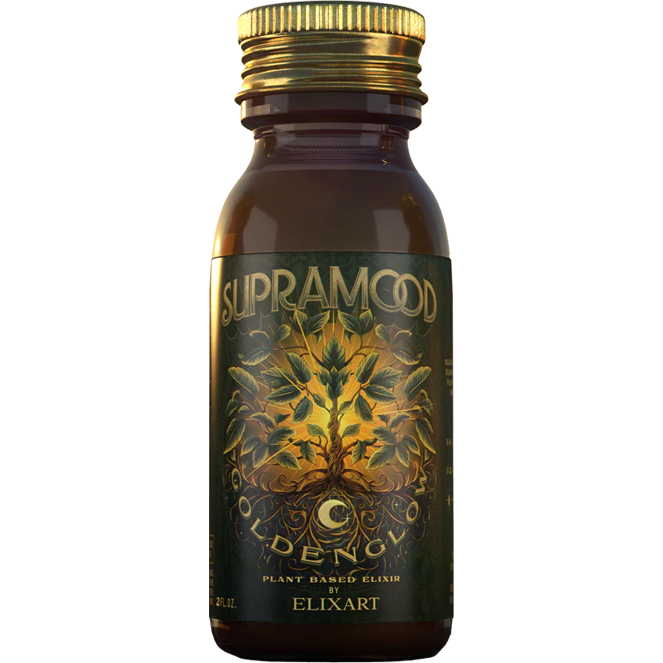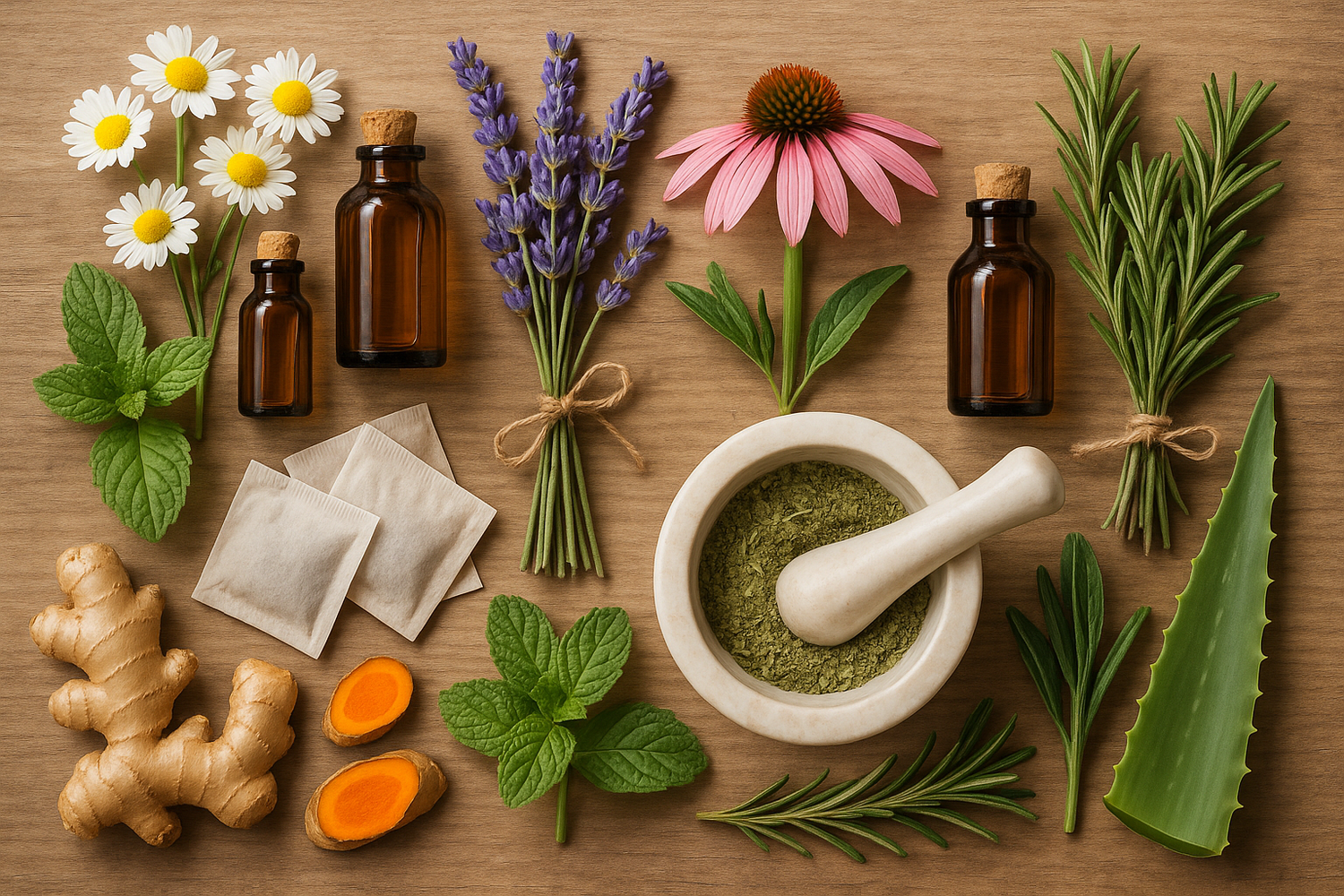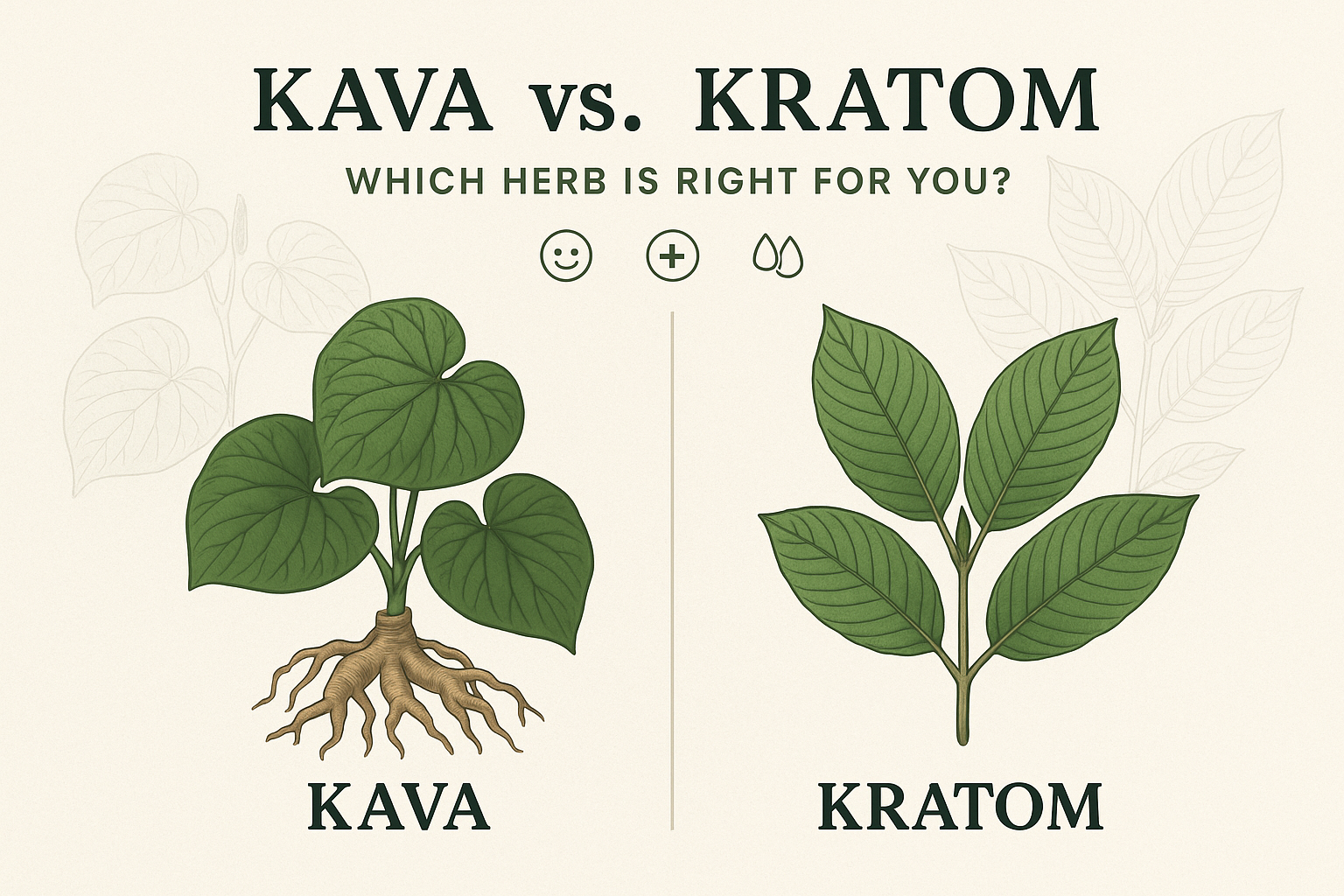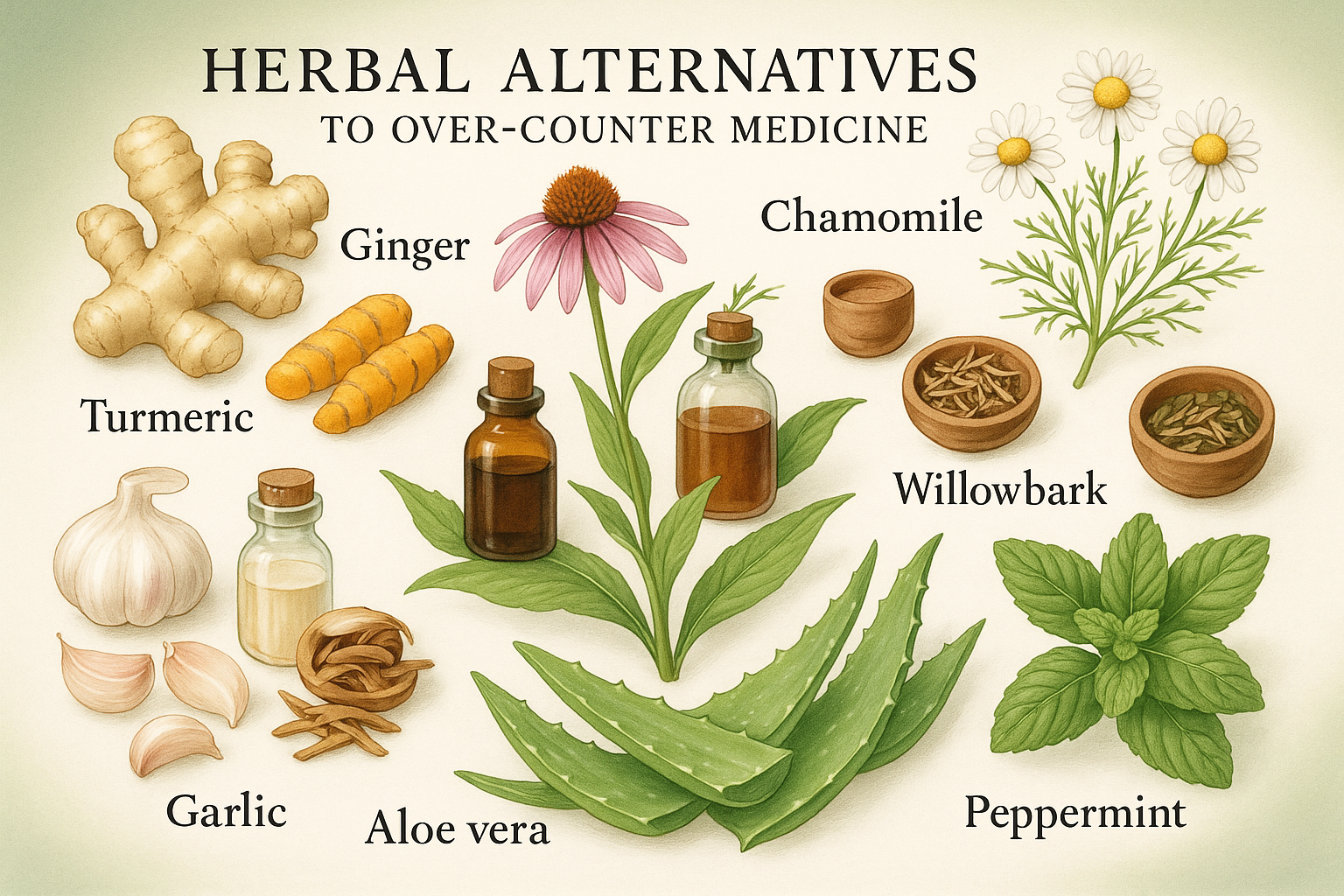For centuries, people have been using herbal remedies to treat common health problems. These natural solutions offer a way to address everyday ailments without relying on synthetic drugs and their potential side effects. Herbal remedies take a holistic approach to healing, working with the body's natural processes to alleviate symptoms and promote overall well-being.
Benefits of Natural Solutions:
- Fewer Side Effects: Herbal remedies typically have fewer side effects compared to synthetic drugs.
- Holistic Healing: These remedies address not just the symptoms but also aim to enhance general health.
- Cost-Effective: Often more affordable than pharmaceutical options.
In this article, we'll explore how herbal remedies can be effective in treating:
- Upset Stomach and Nausea: Relief through ginger
- Pain and Inflammation: Management using turmeric
- Migraine Relief: Easing symptoms with lavender oil
- Anxiety Relief: Calming effects of lavender oil
Understanding these natural alternatives can empower you to make informed decisions about your health, integrating the wisdom of nature into your everyday life.
1. Upset Stomach and Nausea
An upset stomach and nausea can result from various factors such as:
- Overeating or consuming spicy, fatty, or greasy foods
- Food poisoning or infections
- Motion sickness
- Emotional stress
- Gastrointestinal disorders like Irritable Bowel Syndrome (IBS)
Ginger has been used for centuries to alleviate symptoms of an upset stomach and nausea. Its anti-inflammatory and digestive properties help soothe the stomach lining and enhance digestion. The active compounds in ginger, such as gingerol and shogaol, work by regulating gastric contractions and providing a calming effect on the gastrointestinal system.
There are several ways to consume ginger to reap its benefits:
- Tea: Steeping fresh ginger slices in hot water for 10 minutes.
- Capsules: Available in health stores as a convenient option.
- Fresh: Chewing on raw ginger or adding it to meals.
The effective dosage of ginger can vary depending on the form:
- Tea: Drink 2–3 cups daily.
- Capsules: Typically, 250 mg taken 2–4 times daily.
- Fresh: About 1–2 grams per day.
For best results, consume ginger shortly before meals or at the onset of symptoms. Always start with lower doses to assess tolerance.
2. Pain and Inflammation
Certain types of pain and inflammation can be effectively alleviated using herbal remedies. Common conditions include:
- Arthritis: Characterized by joint inflammation causing pain and stiffness.
- Muscle Soreness: Often a result of overexertion or injury.
- Chronic Pain: Persistent pain that lasts for weeks or months.
The Role of Turmeric in Pain Management
Turmeric stands out as a potent anti-inflammatory herb. Its active compound, curcumin, is renowned for its ability to reduce inflammation and alleviate pain. Studies have shown that curcumin can be as effective as some anti-inflammatory drugs but without the side effects.
Utilizing Turmeric Effectively
To harness turmeric's medicinal properties:
- Turmeric Powder: Add to meals or smoothies. A common dosage is 1-3 grams per day.
- Turmeric Tea: Boil turmeric powder or sliced fresh turmeric root in water for a soothing tea.
- Curcumin Supplements: Available in capsule form, often combined with black pepper extract (piperine) to enhance absorption.
Incorporate these methods into your daily routine to manage pain and inflammation naturally. Always consider starting with a lower dose to monitor how your body reacts before increasing the amount.
3. Natural Solution for Migraines
Understanding migraines and treating them holistically can significantly improve your quality of life. Migraines are severe headaches characterized by intense throbbing pain, often accompanied by nausea, vomiting, and sensitivity to light and sound. Common triggers include stress, hormonal changes, certain foods, and sensory stimuli.
One effective natural remedy for migraines is lavender oil. Known for its calming properties, lavender oil can help alleviate migraine symptoms. Studies suggest that inhaling lavender oil during a migraine attack can reduce the severity of the headache.
Here are different approaches to using lavender oil for maximum benefit:
- Aromatherapy: Inhale lavender oil directly from the bottle or use a diffuser to spread its scent throughout the room.
- Topical Application: Dilute lavender oil with a carrier oil (such as coconut or jojoba oil) and apply it to your temples and neck.
- Bath Soak: Add a few drops of lavender oil to your bathwater for a soothing experience that may help relieve tension and stress-induced migraines.
Experiment with these methods to find what works best for you, ensuring you choose high-quality essential oils for optimal results.
4. Natural Ways to Relieve Anxiety with Herbal Remedies
Anxiety disorders affect millions of people worldwide, often leading to symptoms like restlessness, tension, and a constant feeling of unease. Herbal interventions offer a natural alternative to traditional pharmaceuticals, providing relief without the side effects associated with many prescription medications.
Understanding the Calming Effects of Lavender Oil
Lavender oil is well-known for its ability to promote relaxation and reduce anxiety:
- Reduces anxiety levels: Studies have shown that lavender oil can significantly lower anxiety levels in individuals.
- Improves sleep quality: The soothing aroma of lavender helps improve sleep, which is often disrupted by anxiety.
- Enhances overall mood: Regular use of lavender oil can lead to a noticeable improvement in mood and emotional well-being.
Safety Tips for Using Lavender Oil for Anxiety Relief
When using lavender oil, it's important to consider the following safety tips:
- Dosage and application: Use 2-4 drops of lavender oil in a diffuser or add it to bathwater. It's also effective when applied topically after dilution with a carrier oil.
- Allergic reactions: Before applying lavender oil to your skin, perform a patch test to check for any allergic reactions.
- Consulting healthcare providers: If you are pregnant, breastfeeding, or currently taking other medications, it's always best to consult with a healthcare provider before using lavender oil.
Incorporating lavender oil into your daily routine can provide significant relief from anxiety symptoms while enhancing overall mental health.
The Importance of Consulting a Doctor Before Trying Herbal Remedies
Using herbal remedies for everyday ailments can be beneficial, but there are risks involved in diagnosing and treating yourself without professional advice. Without a doctor's guidance, you might:
- Misdiagnose your condition
- Choose an inappropriate remedy
This can lead to:
- Ineffective treatment
- Adverse effects
Special Precautions for Pregnant or Breastfeeding Individuals
If you're pregnant or breastfeeding, it's especially important to take special precautions when considering herbal remedies. Some herbs have the potential to:
- Cross the placenta
- Be excreted in breast milk
This could potentially harm your baby. To ensure the safety of both you and your child, always consult a healthcare professional before using any herbal products during these sensitive periods.
Potential Interactions with Prescription Medications
It's also crucial to be aware that herbal remedies can interact with prescription medications. In some cases, these interactions can:
- Enhance the effects of the medication
- Diminish the effects of the medication
For example, St. John's Wort is known to interfere with antidepressants and other drugs, which can have serious consequences for your health. That's why it's essential to have open communication with your doctor about all the supplements and herbs you are taking. This will help prevent any harmful interactions from occurring.
How to Find a Reputable Healthcare Professional
If you're interested in exploring herbal medicine as part of your healthcare routine, it's important to find a doctor who is knowledgeable about this field. Here are some steps you can take to find a reputable healthcare professional who understands herbal medicine:
- Seek referrals from trusted sources such as friends, family members, or other healthcare providers.
- Check credentials and certifications to ensure that the doctor has received proper training in both conventional medicine and herbal medicine.
- Ensure that the doctor has experience in treating patients using a combination of conventional and herbal approaches.
By consulting a doctor who specializes in herbal medicine, you can:
- Receive accurate diagnoses
- Get personalized treatment recommendations
- Avoid potential risks or complications associated with self-medication
Remember, your health is unique, and what works for one person may not work for another. Consulting a doctor ensures you are making informed decisions tailored to your specific health needs, safeguarding your well-being while exploring nature's solutions.
Understanding the Role of Herbal Medicine in Supporting Overall Health
Herbal medicine works by using plants to treat diseases and improve overall health. This approach to healing focuses on the idea that the body, mind, and spirit are all connected and that we should strive for balance in order to be healthy.
Key Medicinal Plants Used in Herbal Medicine
Here are some important medicinal plants that are commonly used in herbal remedies:
- Echinacea: This plant is known for its ability to boost the immune system and help prevent colds and infections.
- Chamomile: Widely recognized for its calming effects, chamomile is often used to treat sleep disorders and digestive problems.
- Ginseng: This herb is frequently used to increase energy levels, improve cognitive function, and reduce stress.
Herbal remedies not only aim to relieve symptoms but also work towards improving overall well-being. For example, chamomile tea can help with insomnia and promote a sense of relaxation. Turmeric, on the other hand, is not only effective in reducing inflammation and managing pain but also supports liver health and reduces oxidative stress.
By incorporating these natural solutions into our daily lives, we can take a proactive approach to our health. This means making them a regular part of our routines rather than just using them when we're sick or experiencing symptoms.
The focus on using natural treatments derived from plants aligns with the increasing interest in sustainable and holistic healthcare practices.
Ensuring Safe Use of Herbal Remedies: Precautions for Avoiding Interactions with Pharmaceuticals
Using herbal remedies alongside pharmaceutical medications requires caution to prevent any potential interactions. These interactions can impact how effective and safe both the herbs and drugs are.
Key Considerations:
1. Communicate with Your Healthcare Providers
Always let your healthcare provider know about any herbal remedies you are using along with your prescription drugs. This open communication allows them to better monitor and manage any possible interactions.
2. Be Aware of Potential Interactions
Certain herbs have the ability to either enhance or reduce the effects of pharmaceuticals. Here are a few examples:
- St. John’s Wort can make birth control pills and antidepressants less effective.
- Ginkgo Biloba may increase the risk of bleeding when taken with anticoagulants like warfarin.
3. Take Safety Precautions
When using herbal remedies, it's important to take certain safety measures:
- Start with small doses to see if there are any negative reactions.
- Stick to a consistent schedule so you can accurately monitor any effects.
- Unless specifically advised by a healthcare professional, avoid using multiple herbs at the same time.
Additional Steps to Ensure Safety:
In addition to the key considerations mentioned above, here are some extra measures you can take:
- Research and Keep Track: Maintain a detailed record of all the supplements and medications you are currently taking.
- Seek Reliable Information: Look for information from reputable medical websites or consult with a healthcare professional who specializes in integrative medicine.
By understanding and following these precautions, you can effectively use herbal remedies while prioritizing your well-being.
How to Easily Include Herbal Remedies in Your Daily Life for Long-Term Wellness Benefits
Incorporating herbal remedies into your everyday life can be a seamless process with significant long-term wellness benefits. Here are some practical tips to help you get started:
1. Start Small
Begin by incorporating one or two herbal remedies into your routine. For example, you could start your day with a cup of ginger tea to aid digestion and end it with a lavender-infused bath to promote relaxation.
2. Use Fresh Ingredients
Whenever possible, opt for fresh herbs over dried ones. Fresh herbs often contain higher levels of active compounds and can be easily added to meals, teas, or topical applications.
3. Create a Routine
Make herbal remedies a part of your daily rituals. Add turmeric powder to your morning smoothie or oatmeal for its anti-inflammatory benefits, or use peppermint oil in a diffuser to enhance focus and mental clarity during work hours.
4. Consider Herbal Supplements
Think about including herbal supplements in your diet. Capsules or tinctures containing concentrated extracts can provide potent health benefits. Always follow the recommended dosage on the label.
5. Try DIY Herbal Projects
Engage in simple do-it-yourself projects like making your own herbal salves, tinctures, or teas. This not only ensures you know exactly what goes into your remedies but also adds a personal touch to your wellness journey.
6. Stay Informed
Keep yourself updated on the latest research and recommendations regarding herbal medicine. Books, reputable websites, and consultations with knowledgeable healthcare providers can offer valuable insights.
By gradually incorporating these practices into your lifestyle, you can harness the healing power of nature's solutions and enjoy sustained health benefits.
Conclusion
Exploring herbal remedies offers a path to address everyday ailments using natural solutions. Embracing herbs for common health issues can be effective, but it's important to use them responsibly and with knowledge. By incorporating the power of nature into your wellness routine, you may experience relief and improve your overall wellbeing. Remember to seek guidance from healthcare professionals for proper usage.
FAQs (Frequently Asked Questions)
What are herbal remedies and how are they used to treat everyday ailments?
Herbal remedies are natural solutions derived from plants that can be used to address common health issues. They can be administered in various forms such as teas, capsules, or fresh ingredients, and are effective in providing relief from everyday ailments without the use of over-the-counter drugs.
What are the benefits of opting for natural solutions over over-the-counter drugs?
Choosing natural solutions such as herbal remedies offers the advantage of addressing health issues without the potential side effects associated with conventional medications. Additionally, herbal remedies often provide holistic benefits that promote overall wellbeing.
What are some common health issues that can be treated with herbal remedies?
Common health issues that can be effectively addressed with herbal remedies include upset stomach and nausea, pain and inflammation, migraine relief, anxiety relief, and overall support for general wellbeing.
How can ginger help in providing relief from upset stomach and nausea?
Ginger is known for its ability to alleviate symptoms of upset stomach and nausea due to its natural anti-inflammatory properties. It can be consumed in various forms such as tea, capsules, or fresh, with appropriate dosage and administration methods for optimal effectiveness.
What role does turmeric play in managing pain and inflammation?
Turmeric is a potent anti-inflammatory herb that can effectively alleviate various types of pain and inflammation. It can be utilized for its medicinal properties by incorporating it into one's daily routine through consumption or topical application.
How can lavender oil be used as a natural remedy for migraines?
Lavender oil serves as a natural remedy for migraines by exhibiting anxiolytic effects and promoting relaxation. It can be used through different approaches such as inhalation or topical application to maximize its benefits in providing relief from migraines.
What precautions should be taken when using herbal remedies alongside prescription medications?
It is crucial to consult a healthcare professional before using herbal remedies alongside prescription medications to avoid potential interactions. Open communication with healthcare providers regarding concurrent use of herbs and pharmaceuticals is essential to ensure safety and effectiveness of treatment.







Leave a comment
This site is protected by hCaptcha and the hCaptcha Privacy Policy and Terms of Service apply.